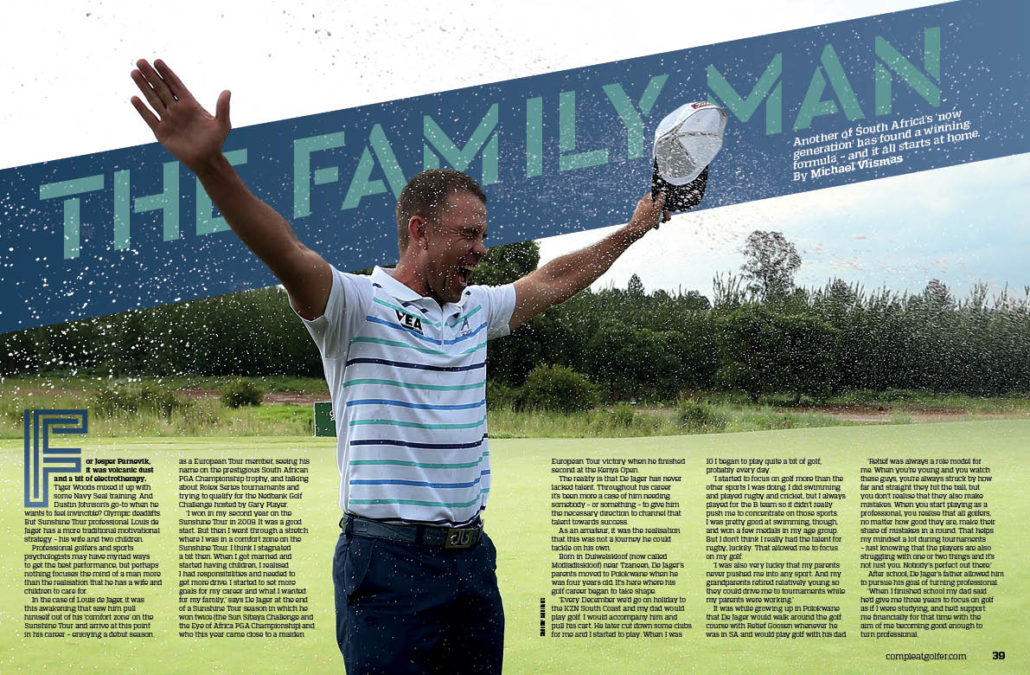Louis de Jager, another of South Africa’s ‘now’ generation, has found the winning formula, and it all starts at home, writes MICHAEL VLISMAS.
For Jesper Parnevik, it was volcanic dust and a bit of electrotherapy.
Tiger Woods mixed it up with some Navy Seal training.
And Dustin Johnson’s go-to when he wants to feel invincible? Olympic deadlifts.
But Sunshine Tour professional Louis de Jager has a more traditional motivational strategy – his wife and two children.
Professional golfers and sports psychologists may have myriad ways to get to the best performance, but perhaps nothing focuses the mind of a man more than the realisation that he has a wife and children to care for.
In the case of Louis de Jager, it was this awakening that saw him pull himself out of his ‘comfort zone’ on the Sunshine Tour and arrive at this point in his career – enjoying a debut season as a European Tour member, seeing his name on the prestigious South African PGA Championship trophy, and talking about Rolex Series tournaments and trying to qualify for the Nedbank Golf Challenge hosted by Gary Player.
‘I won in my second year on the Sunshine Tour in 2009. It was a good start. But then I went through a stretch where I was in a comfort zone on the Sunshine Tour. I think I stagnated a bit then. When I got married and started having children, I realised I had responsibilities and needed to get more drive. I started to set more goals for my career and what I wanted for my family,’ says De Jager at the end of a Sunshine Tour season in which he won twice (the Sun Sibaya Challenge and the Eye of Africa PGA Championship), and who this year came close to a maiden European Tour victory when he finished second at the Kenya Open.
The reality is that De Jager has never lacked talent. Throughout his career it’s been more a case of him needing somebody – or something – to give him the necessary direction to channel that talent towards success.
As an amateur, it was the realisation that this was not a journey he could tackle on his own.
Born in Duiwelskloof (now called Modjadjiskloof) near Tzaneen, De Jager’s parents moved to Polokwane when he was four years old. It’s here where his golf career began to take shape.
‘Every December we’d go on holiday to the KZN South Coast and my dad would play golf. I would accompany him and pull his cart. He later cut down some clubs for me and I started to play. When I was 10 I began to play quite a bit of golf, probably every day.
‘I started to focus on golf more than the other sports I was doing. I did swimming and played rugby and cricket, but I always played for the B team, so it didn’t really push me to concentrate on those sports. I was pretty good at swimming, though, and won a few medals in my age group. But I don’t think I really had the talent for rugby, luckily. That allowed me to focus on my golf.
‘I was also very lucky that my parents never pushed me into any sport. And my grandparents retired relatively young so they could drive me to tournaments while my parents were working.’
It was while growing up in Polokwane that De Jager would walk around the golf course with Retief Goosen whenever he was in SA and would play golf with his dad.
‘Retief was always a role model for me. When you’re young and you watch these guys, you’re always struck by how far and straight they hit the ball, but you don’t realise that they also make mistakes. When you start playing as a professional, you realise that all golfers, no matter how good they are, make their share of mistakes in a round. That helps my mindset a lot during tournaments – just knowing that the players are also struggling with one or two things and it’s not just you. Nobody’s perfect out there.’
After school, De Jager’s father allowed him to pursue his goal of turning professional.
‘When I finished school, my dad said he’d give me three years to focus on golf as if I were studying, and he’d support me financially for that time with the aim of me becoming good enough to turn professional.
‘So I moved to Pretoria and just played golf for six months. Then there was a tournament in Polokwane, the Limpopo Open. I went home and played it and shot 80-80 to miss the cut by a mile. That’s when my dad questioned whether playing so much golf was good for me or was hurting my game. I was basically just trying to do my own thing. That’s when I realised I needed some guidance.
‘So I went to see a coach, Llewellyn van Leeuwen, and he put me in touch with a sports psychologist. Those were things I knew nothing about. It started to give me more direction in my career and my golf improved dramatically. I knew nothing about routines and having the right mindset and setting goals, and that’s what was missing. The sports psychologist helped me crystallise those thoughts. And eight months later I was the No 1 player in South Africa, basically from nowhere.’
This included becoming one of the few players in history to win the amateur double – the South African Amateur and South African Amateur Stroke Play Championships.
After turning professional in 2008, De Jager made his Sunshine Tour breakthrough when he won the 2009 Suncoast Classic. It took him five years before he won again – twice in 2014. And then in 2018 he raised his game when he earned his European Tour card at Qualifying School, at his fifth attempt.
‘It was always a goal of mine, but I never believed I could achieve it. It’s a big mountain to climb at Q-School, but this was the first time I believed I could do it. I was relieved when I got my card, but I also knew I was good enough to do it. I think that self-belief comes with age. I’d also read a lot of self-help books, and my sponsor, Marnu Nel, has taught me to believe in myself and back myself. That’s made a big difference for me too.’
Such moments of self-belief have been key to De Jager’s recent progress.
‘It was very satisfying when I won the Eye of Africa PGA Championship. It’s a historic tournament and there are some big names on that trophy. Your goal as a South African professional is to win all the prestige local tournaments, especially the South African Open, which is definitely also on my list. But the more I’m in those situations to win, the more chance I have of achieving it.’
The success of those around De Jager also gives him the confidence to know he belongs on the European Tour.
‘Justin Harding has achieved a lot lately and that gives you more inspiration and the confidence to know you can also do it. We came through the same era; we played amateur golf together and turned professional around the same time. So it gives you the belief you can do the same.
‘I think my generation of players is starting to peak now. The best is still to come and I believe we’ll have a whole lot of South Africans in the top 50 and even the top 10 in the world in the next 10 years.’
The next step for De Jager is to start teeing it up at the bigger tournaments on the European Tour.
‘The goal was to win a tournament this season. But my focus this year is also on the Rolex Series on the European Tour and getting into those big weeks. That’s important and I’m ready for them. Then I’d like to try to qualify for the Nedbank Golf Challenge and the Race to Dubai.’
Looking at his game as he seeks to make these goals a reality, De Jager also has a keener understanding of where his strengths and weaknesses lie.
‘I have my golf flaws I keep falling back on, especially when I’m under pressure. So it’s important for me to stick to the basics in my swing. It’s kind of like keeping the balance in a plane as you’re flying. I’m very much a feel player during tournaments. I try to focus on one swing thought for the week. But when I’m practising and working on my game, I’m pretty technical about things. It’s a good combination for me.’
And then it’s just a question of him always finding the one thing that keeps focusing his talent in the right direction.
‘Golf is competitive, so any advantage you can give yourself will help,’ he says.
Right now, a three-year-old and two-year-old are proving to be one heck of a competitive advantage for De Jager.







